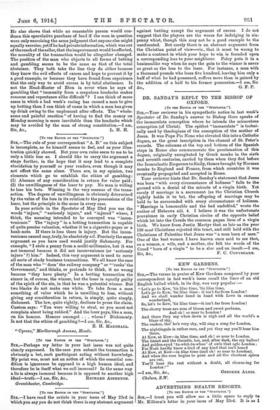[TO TEE EDITOR OF TEE "SPECTATOR. "]
SIR,—The rule of your correspondent "A. B." on this subject is incomplete, as he himself seems to feel, and as your illus- tration quickly showed. But your own rules seem to me to be only a little less so. I should like to carry the argument a stage further, in the hope that it may lead to a complete elucidation by yourself or your readers, even though it may not effect the same alone. There are, in my opinion, two elements which go to establish the ethics of gambling : (1) Absence of any consideration in return for value paid; (2) the unwillingness of the loser to pay. No man is willing to lose his bets. Winning is the very essence of the trans- action. The degree of unwillingness is obviously determined by the value of the loss in its relation to the possessions of the loser, but the principle is the same in every case.
In your article in the Spectator of May 23rd you use the words "injure," "seriously injure," and "injured" where, I think, the meaning intended to be conveyed was "incon- venience." The " injury " in a betting transaction is capable of quite precise valuation, whether it be a cigarette-paper or a bank-note. If there is loss there is injury. But the incon- venience caused may, truly, be absolutely nil. Precisely the same argument as you have used would justify dishonesty. For example, " I stole a penny from a multi-millionaire, but it was not immoral because it did not inconvenience (or 'seriously injure' ?) him." Indeed, this very argument is used to cover all sorts of shady business transactions. We all know the case of the man who " does' the railway company " or " 'rooks' the Government," and thinks, or pretends to think, it no wrong because "they have plenty." In a betting transaction the sinner is, of course, the winner, but the loser is equally guilty of the spirit of the sin, in that he was a potential winner. But two blacks do not make one white. To take from a man something of value which he is unwilling to lose, without giving any consideration in return, is simply, quite simply, dishonest. The law, quite rightly, declines to press the claim. Opstom says : "You were willing to steal, so you must not complain about being robbed." And the loser pays, like a man, on his honour. Honour amongst . . . whom ? Dishonesty. Is not that the ethics of gambling ?—I am, Sir, Ize.,










































 Previous page
Previous page